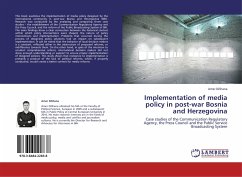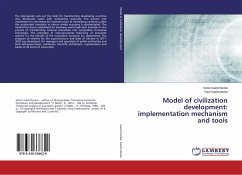This book examines the implementation of media policy designed by the international community in post-war Bosnia and Herzegovina (BiH). Research was conducted by the analyzing and comparing three case studies the establishment of the Communication Regulatory Agency and the Press Council, and the reform of the Public Broadcasting System of BiH. The main findings show a clear connection between the historical context within which policy interventions were shaped, the nature of policy interventions and implementation. Problems that occurred during the process of designing policy solutions had an impact on subsequent implementation. It can be noted that the behavior of local decision makers is a constant, reflected either in the obstruction of proposed reforms, or indifference towards them. On the other hand, in spite of the intention to conduct comprehensive reform, international decision makers did not show enough understanding or support to ensure proper implementation of designedpolicies. This study shows that resistance to implementation is primarily a product of the lack of political reforms, which, if properly conducted, would create a better context for media reforms.
Bitte wählen Sie Ihr Anliegen aus.
Rechnungen
Retourenschein anfordern
Bestellstatus
Storno








